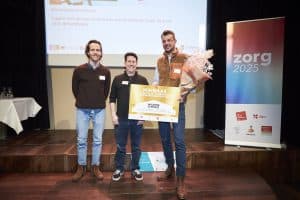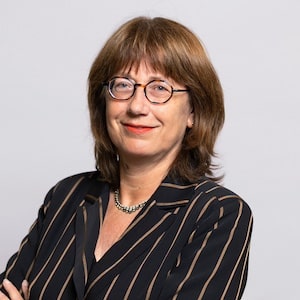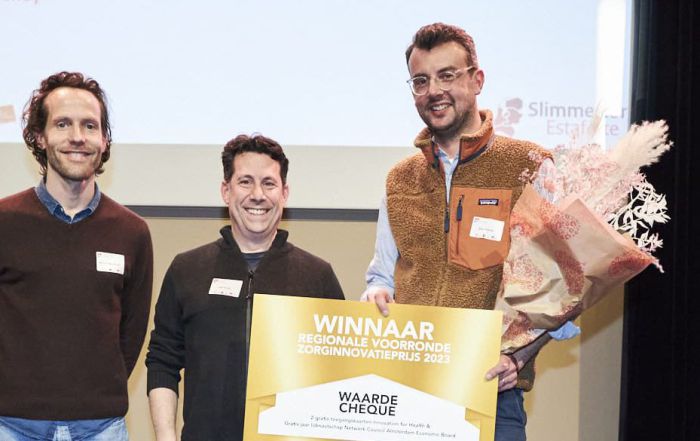‘Wij helpen professionals om de zorgverlener te zijn die ze willen zijn’
Het duurt lang voordat zorginnovaties op de markt komen. Te lang. Ons nieuwe Network Councillid Bart Geerts, CEO van de Amsterdamse startup Healthplus.ai, won onlangs de regionale Zorginnovatieprijs en laat zien hoe we het zorgecosysteem kunnen verbeteren. “We spreken tegenwoordig vaak met de probleemhouder én iemand van IT, dat blijkt een gouden combinatie.”
Bart Geerts vermoedt dat het geen toeval is. Daags na het winnen van de Noord-Hollandse Zorginnovatieprijs kreeg hij verschillende telefoontjes van buitenlandse investeerders. “Ik was verrast over het bereik van zo’n prijs, maar verder zijn we sindsdien vooral doorgegaan met hard werken aan ons product. We zijn door allerlei certificeringshoepels aan het springen en dat vergt onze aandacht.”
Geerts is oprichter van Healthplus.ai en won de prijs met Periscope. Die tool kan nauwkeurig voorspellen of een patiënt na een operatie een infectie zal krijgen. Daardoor kunnen zorgverleners proactiever voor hun patiënten zorgen. Als winnaar van de regionale Zorginnovatieprijs mag Healthplus.ai naar de finale van de Nationale Zorginnovatieprijs 2023. Onderdeel van de prijs is ook een jaarlidmaatschap van de Network Council van Amsterdam Economic Board.
Er kan t/m 29 maart gestemd worden op de publieksprijs, breng hier je stem uit!
Spontane ontmoetingen
De huidige focus op CE-certificering (in overeenstemming met de Europese regelgeving) voor hulpmiddelen belet Geerts en zijn ongeveer zestien collega’s vooralsnog om volop deel te nemen aan het regionale zorgnetwerk. “Ik ben weleens jaloers op bedrijven als Philips die altijd wel overal iemand hebben rondlopen, maar wij moeten nu echt nog keuzes maken. Ik ben nu eigenlijk de enige die regelmatig naar buiten treedt.”
Hij is benieuwd wat de Network Council hem te bieden heeft. Als startup zijn nieuwe contacten altijd prettig. “Wat wij nodig hebben, is best overzichtelijk”, zegt Geerts. “Investeerders, goede contacten bij eindgebruikers, zorgverzekeraars en potentiële klanten. Maar bij de Network Council verheug ik me juist ook op de spontane ontmoetingen, met mensen uit andere sectoren. Ik heb ook bewust een algemene MBA gevolgd en niet een die gericht is op zorg. Daar heb ik net zoveel geleerd van bankiers als van collega-artsen.”
Andersom hoopt Geert wat startupmentaliteit te kunnen toevoegen aan de Network Council. Een mentaliteit van focus en vaart maken. “Een gemiddeld gevestigd bedrijf doet 7 jaar over medische CE-certificering, wij proberen het in 3,5 jaar te doen”, zegt Geerts. “En de eerste keer dat we Periscope implementeerden en operationeel hadden duurde dat zes maanden. Dat was in Leiden. In het Radboud Medisch Centrum waren we tien keer sneller.”
Een trage start
Wat Geerts betreft kan het niet snel genoeg gaan. Want Healthplus.ai maakte een trage start. “Onze start liep synchroon met de lancering van de AVG (Algemene Verordening Gegevensbescherming) en omdat we ons met data bezighouden bleek dat een waardeloze timing. Pas twee jaar geleden konden we vol gas geven en sindsdien hebben we veel geleerd. Niet alleen over de implementatie, maar ook over hoe we de gesprekken voeren in ziekenhuizen. Tegenwoordig vaak met de probleemhouder én iemand van IT, dat blijkt een gouden combinatie.”
Dit soort ervaringen zou Geerts graag meer uitwisselen met andere startups rondom zorginnovatie. “In de Metropool Amsterdam is er weinig overlap in wat we doen terwijl we tegelijkertijd veel dezelfde uitdagingen hebben binnen health-tech.” Tijdens de uitreiking van de Zorginnovatieprijs besprak hij met Douwe Jippes van Healthy.Capital dat netwerkbijeenkomsten voor deze groep zeer waardevol zouden kunnen zijn. Ook Amsterdam Economic Board wil hieraan meewerken. “Ik hoop dat we met zo’n groep in een veilige setting kunnen samenkomen om te voorkomen dat we elkaars fouten herhalen. Het kan dan gaan over saaie onderwerpen als hoe je je pensioenen regelt, maar ook over hoe je goede R&D opzet.”
Netwerken faciliteren ziet Geerts als een belangrijke taak van Amsterdam Economic Board. Dwarsverbanden leggen tussen verschillende sectoren, omdat veel organisaties zich met dezelfde thema’s bezighouden. Initiatieven als AMdEX, voor het delen van data, en de Gezondheidsdata Infrastructuur volgt Geerts met veel interesse. “Vooral om te zien hoe zij omgaan met security en privacy, niet zozeer om de toepassingen zelf. Wij gebruiken namelijk de data van de ziekenhuislocatie voor het recalibreren van onze modellen. Per locatie verschillen de patiëntpopulatie, de manier van werken en de protocollen. Dat beïnvloedt allemaal de infectierisico’s.”
Certificering
Certificering is ook een interessant thema voor op de agenda van Amsterdam Economic Board, vindt Geerts. Veel bedrijven in het zorgnetwerk strijden hier immers mee. “Het proces is aan de ene kant heel leerzaam voor ons: het dwingt ons als startend bedrijf om onze processen goed in te richten en systematischer te werken. Je wordt gedwongen om heel goed na te denken over alle risico’s en daar heb je als bedrijf ook iets aan. Tegelijkertijd is het ontzettend complex: bij ons zijn er twee mensen fulltime mee bezig en dat hebben we ook nog wat externe consultancy ingehuurd. Doordat de regelgeving is veranderd is de wachttijd lang. Amerikaanse bedrijven lijken minder vaak over te steken vanwege de nieuwe CE-certificering en startups doen er jaren langer over om hun product op de markt te brengen. Veel zorginnovaties worden hier daardoor niet of veel later in gebruik genomen en dat is zonde.”
Wat de zorginnovatie in de Metropool Amsterdam verder een impuls zou kunnen geven? Dat valorisatie in ziekenhuizen geen vies woord meer is, zegt Geerts. “Er is veel mooi onderzoek dat leidt tot prachtige publicaties. Of er vervolgens iets mee gedaan wordt is vaak een kwestie van toeval, van een paar enthousiaste mensen. Voor bedrijven en spin-offs zou het interessant zijn als hier in ziekenhuizen duidelijke processen voor zijn: bij wie kun je terecht, hoe zorgen we dat eventuele opbrengsten deels terugvloeien naar het ziekenhuis?”
Overzicht houden
Geerts kent de Nederlandse zorg goed. Hij werkte als arts, waar zijn ervaringen de basis legde voor het werk dat hij nu doet. “Toen ik fellow was op een IC heb ik een paar dagen bijgehouden hoe vaak ik werd gebeld: dat was gemiddeld 86 keer per drie uur. Die continue verstoringen maken het moeilijk om overzicht te houden. Om een probleem aan te kunnen pakken als het nog klein is. Met hulpmiddelen als Periscope kun je dat wel. Als je weet dat de kans dat iemand een infectie krijgt klein is, kan diegene eerder naar huis of naar een andere afdeling. Zo hebben we nog stapels ideeën voor toepassingen die de zorg kunnen verbeteren: voor het door ontwikkelen van Periscope, maar bijvoorbeeld ook voor het voorspellen van andere complicaties rondom operaties. Daarmee helpen wij professionals om de zorgverlener te zijn die ze willen en kunnen zijn.”
Maar het gaat Geerts niet alleen om die zorgverlener. “Een fantastische volgende stap zou zijn dat je op basis van allerlei verwachte risico’s aan de patiënt kan vertellen wat die zélf kan doen om risico’s te vermijden. Te vaak is de patiënt een lijdend voorwerp, die de zorg ondergaat en weinig eigen invloed heeft. Er is nog te weinig aandacht voor patiënt specifieke prehabilitatie (het verbeteren van de conditie voorafgaand aan de operatie). Als we mensen straks bijvoorbeeld kunnen vertellen: ‘als u voor de operatie vijf kilo afvalt is de kans zoveel procent kleiner op complicaties’, dan kunnen patiënten zich letterlijk en figuurlijk een stuk sterker voelen als ze een operatie ingaan.”
23 maart 2023
Meer weten over
Neem contact op
Blijf jij ook op de hoogte?
8x per jaar nieuws en events uit de regio: schrijf je in voor de Board Update nieuwsbrief
Deel dit artikel
Wil je op de hoogte blijven?
Volg ons dagelijks op LinkedIn en schrijf je in voor de Board Update nieuwsbrief.
Lees ook deze berichten
- Met de selectie van vier kanshebbers is de regionale voorronde van de ...
- Met meer dan 80 ondernemers, 40 investeerders en diverse dienstverleners bood LSH Capital Match ...
- In tijden van geopolitieke spanningen, technologische revoluties en politieke onzekerheden is het ...





